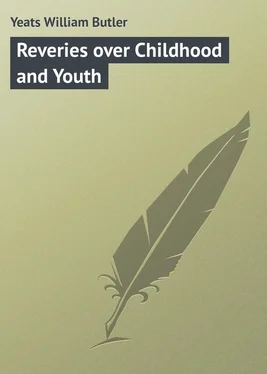William Yeats - Reveries over Childhood and Youth
Здесь есть возможность читать онлайн «William Yeats - Reveries over Childhood and Youth» — ознакомительный отрывок электронной книги совершенно бесплатно, а после прочтения отрывка купить полную версию. В некоторых случаях можно слушать аудио, скачать через торрент в формате fb2 и присутствует краткое содержание. Жанр: foreign_prose, на английском языке. Описание произведения, (предисловие) а так же отзывы посетителей доступны на портале библиотеки ЛибКат.
- Название:Reveries over Childhood and Youth
- Автор:
- Жанр:
- Год:неизвестен
- ISBN:нет данных
- Рейтинг книги:4 / 5. Голосов: 1
-
Избранное:Добавить в избранное
- Отзывы:
-
Ваша оценка:
- 80
- 1
- 2
- 3
- 4
- 5
Reveries over Childhood and Youth: краткое содержание, описание и аннотация
Предлагаем к чтению аннотацию, описание, краткое содержание или предисловие (зависит от того, что написал сам автор книги «Reveries over Childhood and Youth»). Если вы не нашли необходимую информацию о книге — напишите в комментариях, мы постараемся отыскать её.
Reveries over Childhood and Youth — читать онлайн ознакомительный отрывок
Ниже представлен текст книги, разбитый по страницам. Система сохранения места последней прочитанной страницы, позволяет с удобством читать онлайн бесплатно книгу «Reveries over Childhood and Youth», без необходимости каждый раз заново искать на чём Вы остановились. Поставьте закладку, и сможете в любой момент перейти на страницу, на которой закончили чтение.
Интервал:
Закладка:
Yeats W. B. William Butler
Reveries over Childhood and Youth
Sometimes when I remember a relative that I have been fond of, or a strange incident of the past, I wander here and there till I have somebody to talk to. Presently I notice that my listener is bored; but now that I have written it out, I may even begin to forget it all. In any case, because one can always close a book, my friend need not be bored.
I have changed nothing to my knowledge, and yet it must be that I have changed many things without my knowledge, for I am writing after so many years, and have consulted neither friend nor letter nor old newspaper and describe what comes oftenest into my memory.
I say this fearing that some surviving friend of my youth may remember something in a different shape and be offended with my book.
Christmas Day, 1914.REVERIES OVER CHILDHOOD AND YOUTH
My first memories are fragmentary and isolated and contemporaneous, as though one remembered vaguely some early day of the Seven Days. It seems as if time had not yet been created, for all are connected with emotion and place and without sequence.
I remember sitting upon somebody’s knee, looking out of a window at a wall covered with cracked and falling plaster, but what wall I do not remember, and being told that some relation once lived there. I am looking out of another window in London. It is at Fitzroy Road. Some boys are playing in the road and among them a boy in uniform, a telegraph boy perhaps. When I ask who the boy is, a servant tells me that he is going to blow the town up, and I go to sleep in terror.
After that come memories of Sligo, where I live with my grandparents. I am sitting on the ground looking at a mastless toy boat, with the paint rubbed and scratched, and I say to myself in great melancholy, “it is further away than it used to be,” and while I am saying it I am looking at a long scratch in the stern, for it is especially the scratch which is further away. Then one day at dinner my great-uncle William Middleton says, “we should not make light of the troubles of children. They are worse than ours, because we can see the end of our trouble and they can never see any end,” and I feel grateful for I know that I am very unhappy and have often said to myself, “when you grow up, never talk as grown-up people do of the happiness of childhood.” I may have already had the night of misery when, having prayed for several days that I might die, I had begun to be afraid that I was dying and prayed that I might live. There was no reason for my unhappiness. Nobody was unkind, and my grandmother has still after so many years my gratitude and my reverence. The house was so big that there was always a room to hide in, and I had a red pony and a garden where I could wander, and there were two dogs to follow at my heels, one white with some black spots on his head and the other with long black hair all over him. I used to think about God and fancy that I was very wicked, and one day when I threw a stone and hit a duck in the yard by mischance and broke its wing, I was full of wonder when I was told that the duck would be cooked for dinner and that I should not be punished.
Some of my misery was loneliness and some of it fear of old William Pollexfen my grandfather. He was never unkind, and I cannot remember that he ever spoke harshly to me, but it was the custom to fear and admire him. He had won the freedom of some Spanish city for saving life, but was so silent that his wife never knew it till he was near eighty, and then from the chance visit of some old sailor. She asked him if it was true and he said it was true, but she knew him too well to question and his old shipmate had left the town. She too had the habit of fear. We knew that he had been in many parts of the world, for there was a great scar on his hand made by a whaling-hook, and in the dining-room was a cabinet with bits of coral in it and a jar of water from the Jordan for the baptising of his children and Chinese pictures upon rice-paper and an ivory walking-stick from India that came to me after his death. He had great physical strength and had the reputation of never ordering a man to do anything he would not do himself. He owned many sailing ships and once, when a captain just come to anchor at Rosses Point reported something wrong with the rudder, had sent a messenger to say “send a man down to find out what’s wrong.” “The crew all refuse” was the answer. “Go down yourself” was my grandfather’s order, and when that was not obeyed, he dived from the main deck, all the neighbourhood lined along the pebbles of the shore. He came up with his skin torn but well informed about the rudder. He had a violent temper and kept a hatchet at his bedside for burglars and would knock a man down instead of going to law, and I once saw him hunt a group of men with a horsewhip. He had no relation for he was an only child, and being solitary and silent, he had few friends. He corresponded with Campbell of Islay who had befriended him and his crew after a shipwreck, and Captain Webb, the first man who had swum the Channel and who was drowned swimming the Niagara Rapids, had been a mate in his employ and became a close friend. That is all the friends I can remember and yet he was so looked up to and admired that when he returned from taking the waters at Bath his men would light bonfires along the railway line for miles, while his partner William Middleton whose father after the great famine had attended the sick for weeks, and taken cholera from a man he carried in his arms into his own house and died of it, and was himself civil to everybody and a cleverer man than my grandfather, came and went without notice. I think I confused my grandfather with God, for I remember in one of my attacks of melancholy praying that he might punish me for my sins, and I was shocked and astonished when a daring little girl – a cousin I think – having waited under a group of trees in the avenue, where she knew he would pass near four o’clock on the way to his dinner, said to him, “if I were you and you were a little girl, I would give you a doll.”
Yet for all my admiration and alarm, neither I nor anyone else thought it wrong to outwit his violence or his rigour; and his lack of suspicion and a certain helplessness made that easy while it stirred our affection. When I must have been still a very little boy, seven or eight years old perhaps, an uncle called me out of bed one night, to ride the five or six miles to Rosses Point to borrow a railway-pass from a cousin. My grandfather had one, but thought it dishonest to let another use it, but the cousin was not so particular. I was let out through a gate that opened upon a little lane beside the garden away from ear-shot of the house, and rode delighted through the moonlight, and awoke my cousin in the small hours by tapping on his window with a whip. I was home again by two or three in the morning and found the coachman waiting in the little lane. My grandfather would not have thought such an adventure possible, for every night at eight he believed that the stable-yard was locked, and he knew that he was brought the key. Some servant had once got into trouble at night and so he had arranged that they should all be locked in. He never knew, what everybody else in the house knew, that for all the ceremonious bringing of the key the gate was never locked.
Even to-day when I read “King Lear” his image is always before me and I often wonder if the delight in passionate men in my plays and in my poetry is more than his memory. He must have been ignorant, though I could not judge him in my childhood, for he had run away to sea when a boy, “gone to sea through the hawse-hole” as he phrased it, and I can but remember him with two books – his Bible and Falconer’s “Shipwreck,” a little green-covered book that lay always upon his table; he belonged to some younger branch of an old Cornish family.
Читать дальшеИнтервал:
Закладка:
Похожие книги на «Reveries over Childhood and Youth»
Представляем Вашему вниманию похожие книги на «Reveries over Childhood and Youth» списком для выбора. Мы отобрали схожую по названию и смыслу литературу в надежде предоставить читателям больше вариантов отыскать новые, интересные, ещё непрочитанные произведения.
Обсуждение, отзывы о книге «Reveries over Childhood and Youth» и просто собственные мнения читателей. Оставьте ваши комментарии, напишите, что Вы думаете о произведении, его смысле или главных героях. Укажите что конкретно понравилось, а что нет, и почему Вы так считаете.












